Introduction
The Holy Hierarch John (Maximovitch), Archbishop of Shanghai and Wonderworker, in his Word in Memory of the Holy Royal Martyrs (that truly makes our hearts burn) wrote about the relationship between the future revival of Russia and the Russian people’s repentance of the sin of regicide. In connection with this I well remember one episode that happened not long before the canonization of the Royal Passion-Bearers in 2000. One day a woman called in to a live program on Radio Radonezh and reproached the commentator Viktor Saulkin for his words about repentance: “Do you think that all of us should gather in Red Square and kneel down? That’s really too much!” But Viktor Saulkin answered kindly and calmly: “No, it does not matter. What really matters is what we have in our hearts.” About twenty years have passed and today is the centenary of the Royal Family’s martyrdom. What is in our hearts now? Our “sorrowful testimonies”1 will follow later.
A little-known historical fact
The regicide was prepared beforehand, which, among other things, involved misinformation and paving the way for subsequent misinformation. The historian Peter Multatuli provides interesting information about this in his new book, Emperor Nicholas II. The Ekaterinburg Golgotha (Moscow: Dvuglavy Orel, M.B. Smolin’s Publishing House, 2018, pp. 148-149), mainly concerning the Moscow newspaper Novoye Slovo (“New Word”), which spread various rumors. Thus on June 19, 1918 the newspaper wrote that the Romanovs would allegedly be exiled abroad soon. As Peter Multatuli noted: “This fake news was meant to reassure Germans. However, they were warned that rumors of the tsar’s assassination would also be circulating, but these rumors are meant to save his life and should not be trusted.” (ibid. P. 148). Indeed it was a diabolical scheme: the monarch would be murdered, but nobody was to believe this information. And rumors kept circulating according to this plan, and then disclaimers were published. The historian Georgy Zaytsev in his book, The Romanovs in Ekaterinburg: Seventy-eight Days (Ekaterinburg, 1998), wrote about the rumors of Nicholas II’s alleged execution by firing squad that were being spread by the Bolsheviks. Zaytsev found another motivation that agree’s with Multatuli: By circulating these rumors the Bolsheviks wanted to see the people’s reaction to the tsar’s murder. The people remained silent, so now the Bolsheviks could freely execute the Romanovs. The people proved utterly indifferent to their former tsar’s killing. There is Marina Tsvetaeva’s famous account of how the Muscovites took the news of the shooting of the tsar: “We were standing and waiting for the tram. It was raining. And we heard a boy’s cheeky cry: ‘The shooting of Nicholas Romanov! The shooting of Nicholas Romanov! Nicholas Romanov has been shot by the worker Beloborodov!’ I looked at other people who were waiting for the tram and had surely heard these words. These were workers, poorer members of the intelligentsia, soldiers, and women with children. And there was dead silence! Absolutely no reaction! Each of them bought a newspaper, had a quick glance at it and looked aside… as if staring into the void.” And these were our not-so-distant ancestors. While they were not responsible for killing of Nicholas II, they “killed their minds” (as is sung in the Great Canon of St. Andrew of Crete) by turning their back on the Royal Family with their hardened hearts.
Will it bear fruit?
This is a historical fact related to the centenary of the Imperial Family’s martyrdom: Our people are indifferent to Tsar Nicholas II. People feel pity for their martyred children but really nothing more. As for Tsarina Alexandra, people (not least women) still accuse her of all sorts of crimes. Quite often people say concerning Nicholas II: “He got what he deserved.” Or they even see a “divine retribution for his reign” in his tragic death. One Orthodox woman whom I knew used to say: “There must have been a reason! Nothing happens without a reason! He paid for something that he had committed!” And no arguments could make her change her mind. I even recalled my conversation with one very secular man regarding January 9 [January 9/22, 1905, when the so-called “Bloody Sunday” took place]: “Why did he not come out to his people?” “He was not in in St. Petersburg” “He was!” “Historians write that he wasn’t” “He was!” and so on. She called Nicholas II a “bloody” tsar because she simply wanted to see things in this light. Likewise, that Orthodox woman wanted to blame the emperor for something. But in most cases people simply ignore Nicholas II.
We combine indifference to our own history with our maximalism and categorical judgments (Dostoevsky wrote about categoricalness in his Writer’s Diary as our national trait). Thus we lose the ability to hear others. Everybody is content with his own biases without thinking that in the case of the holy passion-bearer his opinion is borrowed and that he was too lazy to form his own opinion. More than twenty-five years have passed since the collapse of the USSR, and truthful books on the Royal Family were published since as early as perestroika. But most people don’t read them and retain the outdated stereotypical views.
It is not our task to plunge our readers into the “slough” of pessimism. But for the indifference to the tsar in the hearts of our ancestors 100 years ago, the Royal Family would not have been martyred. But for the indifference to the holy emperor in the hearts of our contemporaries today, the poisonous movie “Mathilde”2 would not have been released. We have to admit that despite the protests and unmasking of its lies the movie has received public recognition. As we know, a special screening of the movie was organized for some members of the State Duma and their reaction to the film was the following: “We like Mathilde! Now the tsar has become closer to us!” I cannot help but recall these words by Pushkin: “The mob reads confessions and notes, etc. so avidly because in their baseness they rejoice at the humiliations of the high and the weaknesses of the mighty. Upon discovering any kind of vileness they are delighted. ‘He’s little, like us! He’s vile, like us!’ You lie, scoundrels: he is little and vile, but differently, not like you.”3 (A letter to Peter Vyazemsky, the second half of November, 1825, Mikhailovskoye). But in this movie we encounter lies rather than “humiliation of the high” (I know unchurched people who show no liking for the royal couple who, nevertheless, state: “That’s a pack of nonsense! He loved only Princess Alix.”) But they don’t care what really happened and won’t take the trouble to dig deeper.
Now that the film has been shown the leprosy has manifested itself. But the leper is enjoying his “freedom” without noticing his leprosy or realizing that “freedom” is his idol. Meanwhile, honest people (not necessarily believers) who are not indifferent to their motherland’s history have noticed this “worshipping” and probably shuddered with sorrow in their hearts. And, who knows, maybe the Lord has accepted this shudder as weeping of His people (even if there is just a handful of them) for their country. The filth will be forgotten, while the lamentation will bear fruit.
A remarkable occurrence
It is with horror that I recall how my father explained to me, a six-year-old boy, why from the revolution’s point of view the execution of the Royal Family by shooting was “necessary”. It makes me sick to think that I even didn’t ask him: “But what about their children?” For me the words “necessary for the revolution” were sufficient as the October Revolution was revered as something sacred. Frustrating as it is for me to remember, my mother used to laugh at the holy tsar’s “weakness”. A phrase, allegedly from “the diary of Nicholas II”, stamped on her memory: “I was listening to Tchaikovsky and crying”. I heard about the “Vyrubova’s Diary” in my parents’ conversations from early childhood, which means that they would read this forgery and it influenced them. However, shortly before her death mother would read Twenty-three Steps Down by M.K. Kasvinov with great interest… And she didn’t speak about the Royal Family anymore after that, as their deaths really horrified her.
The slander had such far-reaching effects that relatively recently the moviemaker and my peer Pavel Lungin called the film “Agony” by Elem Klimov “an excellent movie” (Lungin’s father was the script writer). The effect of this poison (in different incarnations) is still very strong today. As one historian noticed, if you begin to speak up for the royal couple in the presence of someone who has an aversion to the royal martyrs, it “sets his teeth on edge”.
But I would like to share one of the most remarkable events in my life with our readers, which demonstrates that the situation is not hopeless.
Over ten years ago there was an exhibition of watercolors by Grand Duchess Olga Alexandrovna at Tsereteli Art Gallery in Moscow. A dandy of dignified appearance, aged about thirty-five, clean-shaven, wearing a blue suit and a crimson tie, was walking along the gallery with a lady and talking profusely about Nicholas II. He was speaking loudly, seemingly addressing his girlfriend but in reality trying to attract everybody’s attention. He would repeat again and again that the tsar’s abdication was an act of treason. I said to myself: “It’s no use arguing with him! He won’t listen to me anyway.” Unable to restrain myself, I came up to this man and addressed him politely: “Have you read Ivan Ilyin?” I expected an affirmative answer (not necessarily a truthful one) because Vladimir Putin had cited Ilyin in his address to the Federal Assembly shortly before that (it was spring of 2005; that event provoked a wide response in the media). The disagreeable man replied: “Yes, of course.” “And have you ever read his essay, Why the Monarchical System Collapsed in Russia?” I asked. “No, I haven’t,” he responded. Then I explained to the man that at first Ilyin was critical, writing that a sovereign is obliged to struggle for his power, and he provided illustrative examples; but later the author proceeded: “As you reflect on this self-sacrificial act [the abdication], it wrings your heart and words don’t come to your mind.” It turned out that I cited Ilyin inaccurately, his exact words were the following: “As you meditate on this living tragedy of our dynasty, your heart drops and you can hardly speak about it anymore.” Suddenly the man stopped behaving like a dandy, his spirit drooped, and he agreed with me in a low, serious voice: “Yes, I definitely must familiarize myself with this work.” Since this boaster was able to come to his senses, I think the situation is not hopeless.
The evil legacy
It is not ours, but God’s, and He alone can turn our hearts to the truth... provided we… Though I’d better stop moralizing. The problem is deep. It is our whole nation’s sin rather than someone’s personal sin, with many sincere people among us under delusion as they “imbibed” these misconceptions “with their mother’s milk”. We are spiritual heirs of the heirs of the generation that left the emperor to the mercy of the prince of the power of the air (cf. Eph. 2:2). We could call it “the generation of the traitors”, but we should avoid affectedness. Indeed there were some people who took the 1917 Revolution as a tragedy with a feeling of deep remorse—both those who were responsible and not responsible for the catastrophe.
Let us recall the story of the father of Metropolitan Anthony (Bloom) of Sourozh, a diplomat, who voluntarily confined himself to seclusion as an act of repentance. Another example is Peter Berngardovich Struve, one of the most active members of the “Liberation Movement” in the late nineteenth to early twentieth century Russia, editor of the Osvobozhdenie (“Liberation”) magazine in 1902-1905 in Paris. In 1909, he became a co-author of the Vekhi (meaning “Landmarks”, “Signposts”, “Milestones” in Russian) collection of essays, and in 1918, of the Iz Glubiny (“Out of Depths”) collection of essays.
Russian thinkers (and Struve is one of the most solid of them) arrived at an unequivocal conclusion: Russia’s intelligentsia led the country to the disaster. Yet this conclusion was philosophical by nature, it didn’t condemn the main idea, “Down with autocracy!”, and lacked of awareness of the betrayal of the tsar in the hearts of their fellow-countrymen. But Struve alone showed signs of repentance in 1919 and later expressed it in emigration in the 1920s. On the whole, the generation that saw the execution of the Imperial Family kept silence about the fact that the atrocity had been committed with their connivance, and its brutal nature (the killing of the children) was excluded from the moral consciousness. And when Osip Mandelstam wrote in his article of 1922, entitled, “The Bloody Mystery-Play of January 9”, “Any child’s cap, mitten, or woman’s scarf thrown pitifully that day in the Petersburg snow left a reminder that the Tsar must die, that the Tsar will die,”4 he surely wasn’t recalling the execution of the royal children. The allegations that “the tsar was bad and weak” overshadowed everything else. Thus, Emperor Paul I was commonly referred to as “a mad tsar” after his assassination despite the fact that the unpunished regicides found this this label more suitable. The attitude towards Nicholas II was expressed by a conventional gesture: “There is nothing to talk about!” I remember being shocked when one day my interlocutor stopped me after I said, “a generally accepted truth” during our conversation that “the tsar was under the heel of his wife”. He interrupted me and argued: “This statement is untrue and it is very easy to prove this.” But my shock was related only to my shame: my interlocutor was a historian, so he knew his subject perfectly well, whereas I showed my ignorance… Notably, then I remained indifferent to the tsar and did not bother to ask him for any evidence. I can also remind myself that when as an active church-goer I read Pierre Gilliard (the French language tutor to the children of Nicholas II) in the early eighties I made only one conclusion: “these Bolsheviks were real skunks!” I liked the reading, liked the Royal Family, yet the only thing that really mattered at that time was my bitter indignation against the Bolsheviks. I was given that “tamizdat” book [a Soviet slang for “foreign-published books”, especially those banned by Soviet censorship], so I lent it to my friends and we would share our impressions with one another.
Before speaking about how I personally came to venerate the Royal Martyrs, I want to share one more amazing story with our readers that is associated with a good friend of mine. When in the 1960s she still attending a Soviet elementary school, one night she saw Nicholas II in a dream! He conversed kindly with her and she felt good with him, although she couldn’t remember any details of the dream. On the following morning their teacher explained to the children that St. Nicholas was a bad ruler and, therefore, deserved our bad attitude toward him. And the girl, whose name was Natasha [a diminutive form of the name Natalia], believed her. Many years passed. Natasha became a devout Christian and gradually came to venerate the Royal Passion-bearers, and she suddenly remembered that story! “He [St. Nicholas II] cast his line!” she concluded her account with these words. I hope the readers understand that this story is not so much about mysticism as about an average elementary school teacher in the Soviet Union…
A personal experience
I am a math teacher by occupation and naturally I cannot do without private lessons. It was in 1992; my daughter was several months old, and the country was starving. Finally I had a private student and needed to help her prepare for a written math exam for the Subdepartment of Structural Linguistics of the Language and Literature Department of Lomonosov Moscow State University. Since the exam was difficult, I gave Masha [a diminutive form of the name Maria] lessons throughout the school year and thus we became friends. Masha was a very able student, so we had some free time for a conversation each time. We both were Orthodox, so we discussed Church-related subjects too. And one day Masha said: “Emperor Nicholas II is a saint.” I instantly lost my temper and shouted: “He cannot be a saint! He abdicated himself!” thus becoming “the prey of the invisible wolf”5. Masha did not say anything in reply and we never returned to this subject. In summer Masha passed the entrance examination, scoring the highest mark. She came back to thank me for my help, we said good-bye to each other, and my family and I went to our summerhouse. One hot sunny day I was walking with my baby girl in the stroller. I remember seeing a footpath, bright sunshine…, when it dawned upon me: “Why did I bawl at Masha?!” At the same moment shame overwhelmed me, albeit that conversation was in the past and I was not in touch with Masha any more. “What should I do now???” I thought. Thus, when asked how I came to venerate the royal martyrs, I always answer: “Through shame.” It was a rather slow process. At that time I stumbled across two books, namely The Murder of The Royal Family by Nikolai Sokolov and The Russian Girl (on Grand Duchess Olga Nikolaevna) by P. Savchenko. While I did like the books, I should confess that from my young days right until the beginning of my life in the Church for many years I particularly respected political dissidents and believed (though now I laugh at it) that the words blessed are they which do hunger and thirst after righteousness (Mt. 5:6) were said about dissidents! And now try and imagine my inner conflict: “Well I never! Are you going to become a monarchist? So you are against freedom! But what about the pogroms? What about Rasputin? The abdication?” These thoughts would torment me as soon as I was kindly disposed to the tsar. I hesitated with forming an opinion about the tsarina and waited for my own decision concerning the tsar. A year passed! I attended the exhibition, “The Last Russian Tsar,” at the Manezh Exhibition Center in Moscow, dedicated to the seventy-fifth anniversary of the Royal Family’s martyrdom. The following words from the diary of Nicholas Alexandrovich stuck in my mind: “I was sitting next to little Alix, whom I really liked a lot.” For justice’s sake I should say that by that time my wife and I had read the book entitled Nicholas and Alexandra by Robert K. Massie and had a high opinion of it. But I was still far from recognizing the tsar as a saint… I felt that something was happening in my soul and that I was “moving in the right direction”. At last it occurred to me to pray! It was a decisive moment because without prayer I would have made no progress. “To whom should I pray? To one of the royal children!” And it became clear that I should pray to Olga Nikolaevna. There was a spring near the village where my family and I would spend time in our summerhouse and we regularly drew water from it to make tea. Once I was walking towards that spring with a can in my hands. I was despondent due to one personal problem. As I was standing by the spring I remembered my idea to pray to Olga Nikolaevna. As soon as I began to pray to her my despondency disappeared! And I felt that I was standing on firm ground. However, I still had doubts and aversion to the tsarina, while understanding that Olga Nikolaevna and she were inseparable. Then I read an article by Archpriest Alexander Shargunov in which he compared the podvig [an exploit, spiritual labor in Russian] of the Royal Martyrs with that of Sts. Boris and Gleb and it helped me a lot. After that I thought: “Why can’t I forgive the tsarina?” Today these words would make me indignant, but then I knew so little genuine information and that decision was a way out…
The Church alone
In Anton Chekhov’s novella, “A Boring Story”, the main character observes the course of his grave illness and makes a record on each stage of the fatal malady. As for me, if I were to observe the stages of my path towards the understanding and veneration of the Royal Martyrs, it would be a story of my journey towards light. I desperately needed to find a like-minded priest. It turned out that a priest who meant a lot to both my spouse and me couldn’t forgive the tsar his abdication and no arguments could make him change his mind; that is why we eventually drifted apart. When I asked another priest if I could pray to the Royal Martyrs and he replied, “Yes, but only privately”, I was not pleased with this answer. But when another priest unexpectedly said, “I believe we can pray to them not only privately” (it was long before their canonization), we immediately became close with him! Glory be to God!
The Orthodox Church alone has a right understanding of Christ, for it He is the King and God. Let us recall that before Baptism a catechumen renounces the satan three times, then joins Christ three times, and thereupon the priest asks him or her: “Do you believe in Him [Christ]?”, and the catechumen responds: “I believe in Him as King and God”, and then reads the Creed. The Orthodox Church alone (and all Orthodox prayers and services are permeated by this) knows the royalty of Christ, sees no contradiction between royalty and meekness, and doesn’t believe that “meek” is synonymous with “weak”. Therefore, the Church alone can have a right understanding of its witness, its martyr who bore his heavy cross as the tsar of Russia.
In my view, the Church applied the principle of economy by canonizing the Royal Family as “passion-bearers”. The spiritual podvig of the Royal Martyrs in confinement is clear to everybody, whereas all the rest has long been a serious bone of contention. Sadly, the canonization of Nicholas II as a “passion-bearer” makes the “heirs of the heirs of that generation” among contemporary Orthodox Christians feel malicious joy. First a debater exclaims: “Only as a passion-bearer!”, and then, having hypocritically recognized him as a saint and having received carte blanche by saying “only”, our wrangler proceeds to sharply criticize Nicholas II as a ruler. To put it in the words of Dostoevsky, “a great idle force”6 is in play, and it goeth not out but by prayer and fasting (Mt. 17:21). Time is on our side. A kind and unprejudiced attitude towards the tsar-martyr bears fruit. Serious and comprehensive books are being published. Let us mention the collected articles, “Tsar and Russia”, along with works of the historians Peter Multatuli and Constantine Kapkov. And the Church people get added evidence that the Golgotha in the “House of Special Purpose” was the culmination of the tsar-martyr’s way of the cross-bearing and ministry.
Unfortunately, in the Church you can find not only individuals who are indifferent to Nicholas II, but also those who “admire” rather than love the royal couple. Some priests repeat again and again: “What a wonderful exploit! What a wonderful exploit!” without going into the heart of the matter. Undoubtedly they think of Nicholas II as of a righteous “God’s fool” on the throne who is unable to rule the country. That is really irresponsible. Alas, we cannot say that the Church devoted the seventeen months between the centenary of the tsar-martyr’s abdication and the centenary of the Royal Family’s martyrdom to a thorough comprehension of the key events of the twentieth century. True, the collected articles, “The Tsar and Russia”, were published… But instead of a large-scale educational campaign addressed to the whole population we wasted time waiting for a final decision on the authenticity of the “Ekaterinburg remains”, which was accompanied by problems (and I don’t deem it wise to mention them now).
The word of a holy hierarch and pastor
Only the Church maintains the idea of repentance for the sin of regicide. Below is an extract from the speech delivered by St. John (Maximovitch) at the Russian memorial church in Brussels in 1962: “Nothing was done to openly defend the sovereign and the throne. The news of the imprisonment of the tsar and his family was met with silence. <…> This left the emperor entirely in the hands of his jailers and the new authorities that were completely free to do whatever they wanted. The regicide lies as a heavy burden upon the conscience and soul of the people. Everybody is guilty to a lesser or greater degree: some by their involvement in or preparation of the mutiny, some by treason and betrayal, others by justifying all of this or exploiting the situation. The murder of the tsar-martyr was a direct consequence of what they had done. His blood be on us, and on our children (cf. Mt. 27:25). Not only on our generation, but also on the new one, which will be brought up in sympathy with the crimes and sentiment that ultimately led to the regicide. It is only utter spiritual separation from all of them, the awareness of their criminal and sinful nature, and repentance on behalf of ourselves and our ancestors that will free Russia from the burden of its sin.”
The sin of indifference towards the Royal Family is still upon us, and we are too far from being “spiritually separated” from those who are reviling the tsar in our days. We conclude our article by an extract from the Statement of His Holiness Patriarch Alexei II of Moscow and All Russia to the Holy Synod of the Russian Orthodox Church on the seventy-fifth anniversary of the murder of Nicholas II and his family. Twenty-five years have passed since he said these words, yet they are still relevant today: “The sin of regicide, which took place amid the indifference of the citizens of Russia, has not been repented of by our people. Being a transgression of both the law of God and civil law, this sin weighs extremely heavily upon the souls of our people, upon its moral conscience. Since then several generations have succeeded one another, yet that heinous crime and a feeling of guilt for lack of repentance have not been erased from the memory of our people. The murder of the Royal Family is a heavy burden upon popular conscience that still remembers that many of our ancestors by their direct involvement, approval and silent connivance were guilty of this sin. The repentance of this sin should become a banner of our unity—not only external but also spiritual unity. And today, on behalf of the whole Church, on behalf of its children, both reposed and living, we proclaim repentance before God and the people for this sin. Forgive us, o Lord! We call to repentance all of our people…7”
Author Andrei Manovstev is a doctoral candidate of mathematics, and teaches math at the Moscow Academy of Foreign Trade.








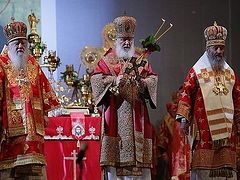
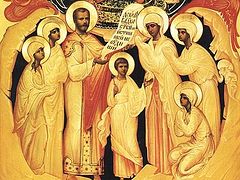
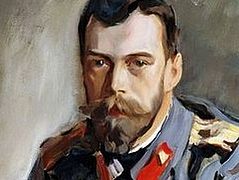
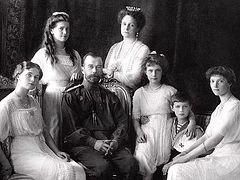
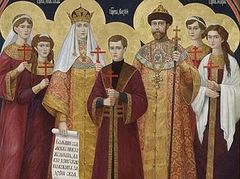
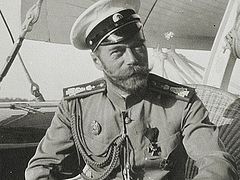
Just one thing: there was no abdication!
https://houseofmaedhros.wordpress.com/2017/07/17/forgive-us-sovereign-2/